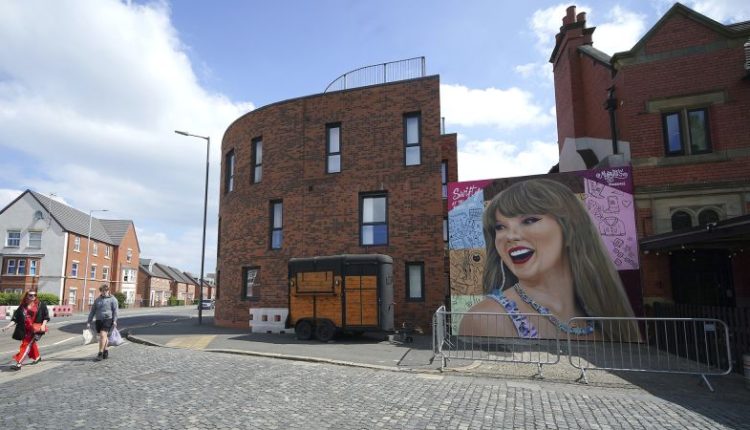In a pub just a stone’s throw from Anfield stadium, where 60,000 fans gather regularly to watch Liverpool Football Club, bar staff are preparing to serve a very different clientele.
The Sandon has been catering to the soccer crowd for more than a century. On Thursday, it expects to welcome Taylor Swift fans heading to Anfield for the first of the superstar’s three “Eras Tour” concerts in Liverpool.
Ceri Smith, floor manager at The Sandon, says concerts like Swift’s infuse the 154-year-old pub with a “completely different” atmosphere.
“It’s mainly girls wanting to dress up and (bachelorette) parties wanting to go to the concerts,” she told CNN, adding that the pub had hired a Swift look-alike to sing karaoke, and set up a glitter face-paint stall for customers.
Smith expects the concerts will give a “massive” boost to the pub’s finances, as well as the legion of bakeries, fish-and-chip shops and hair salons in the Anfield neighborhood, about 2 miles (3.2 kilometers) north of the center of the city.
Local officials expect the concerts will boost the economy of Liverpool — one of the most deprived cities in the United Kingdom — just as the Eurovision Song Contest did last year.
That week of concerts, club nights and other Eurovision-themed events generated nearly £55 million ($70 million) in additional spending in the northern English city, according to a report by Amion Consulting commissioned by Liverpool City Council.
The so-called visitor economy, which includes bars, restaurants, hotels and tourist attractions among other venues, provides a sizable share of the council’s income.
Almost 50% of the business rates — taxes on commercial properties — collected by the local government come from such businesses, according to Harry Doyle, a senior council official responsible for health, wellbeing and culture. “The fact that Taylor is coming to Liverpool… it’s a huge coup for us,” he told CNN.
Liverpool ONE, a complex of more than 170 stores, bars, restaurants and hotels in the city center, forecasts that Swift’s three shows will attract 100,000 additional visitors to the area, generating an extra £12 million ($15.4 million) in spending.
It wouldn’t be the first time Swift sprinkles some of her economic fairy dust over the cities she visits on her mammoth tour, which kicked off in March last year in the United States.
Average sales in restaurants within a 2.5-mile radius (1.6 kilometers) of Swift’s concert venues in the US soared by more than 68% over the days of her performances, according to the Mastercard Economics Institute. Fans also boosted average spending on accommodation by 32% within a 10-mile radius (16 kilometers) of the concerts.
Natalia Lechmanova, chief European economist at the institute, said Liverpool would likely feel the “Swift lift” more strongly than London, where the singer is scheduled to perform for eight nights over June and August.
“We have found in the US that smaller cities have experienced a bigger (economic) impact than larger cities,” she told CNN.
“Filling up a 60-80,000-person stadium in a city like Liverpool is a big deal: It is the event taking place that day, while in London, even if Wembley (stadium) is full, there’s still a bunch of other cultural events going on.”
Liverpool City Council has pulled out all the stops to welcome Swift, partnering with local artists to create a “Taylor Town Trail” — 11 art installations dotted around the city representing the singer’s distinct albums, or musical eras, including a moss-covered grand piano for the “Evermore” album and giant hearts for the “Lover” era.
The University of Liverpool is also hosting a conference, dubbed “Tay Day,” on Wednesday to “debate, discuss, and deconstruct Taylor Swift’s musical, social, and economic impact,“ according to its website. The event will end with a “critical karaoke” session, in which researchers will perform Swift-related essays to one of her tracks.
This excitement around Swift’s visit is reminiscent of another mania that swept Liverpool six decades ago at the height of The Beatles’ popularity.
The legendary band of four Liverpudlians played their first concert at the city’s Cavern Club in 1961. The frenzy that ensued and became known as “Beatlemania” reached its zenith in 1966, according to National Museums Liverpool, when fans’ screams often drowned out the music at the band’s gigs.
“(Swift’s) got a huge following, just as The Beatles did,” said Doyle at Liverpool City Council. “You can’t quite greet artists off a plane at an airport anymore like you used to back when The Beatles were huge, but I’m sure if you could Taylor would have that same reception.”
“She’s probably the biggest pop star on the planet right now,” he added.
In 2015, UNESCO designated Liverpool a City of Music because of its rich musical heritage. Besides The Beatles, the city has spawned bands such as Frankie Goes To Hollywood and Atomic Kitten.
Kevin McManus at Liverpool City Council, who works on supporting the city’s music sector, hopes Swift’s concerts will raise the profile of Liverpool’s small, grassroots music venues — the “lifeblood” of its music sector.
In recent years, music venues in Liverpool, like in the rest of the country, have faced the “double whammy” of the coronavirus pandemic and a cost-of-living crisis that has forced many people to spend less on entertainment, he told CNN.
“People are more choosy about when they go out because they’ve got less money to spend,” McManus said. “But we need to protect (grassroots venues) or we don’t get the next generation of superstars. That’s the reality. Everyone starts somewhere, even Taylor Swift.”
Read the full article here

